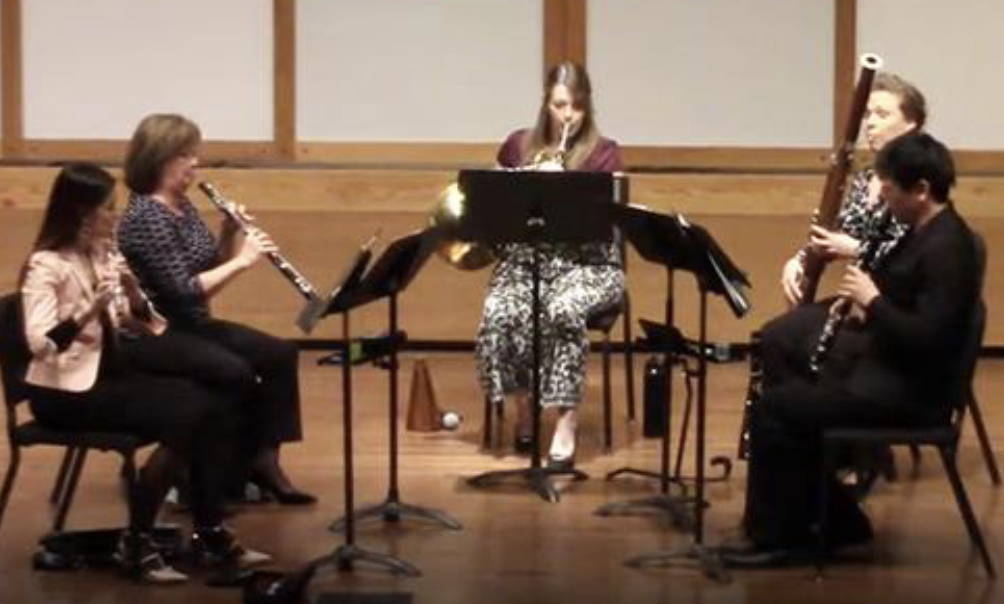by Kevin McLaughlin

What did matter was the quality of the music performed and the playing of the ensemble, which was refined and persuasive. But you could imagine the group’s real motivation: to present music they liked that was substantial and challenging — and that’s close enough for you know what.
The performance was the first appearance by the ensemble — Kimberly Zaleski (flute), Danna Sundet (oboe), Ben Chen (clarinet), Arleigh Savage (bassoon), and Emily Shelley (horn) — on the Rocky River Chamber Music Society’s series.
Valerie Coleman’s Red Clay and Mississippi Delta was more germane than not to the jazz theme. Written in 2008 when the composer was the flutist with the Imani Winds, it is a tricky-to-play, beautifully written work that merges classical and vernacular traditions. Soloists all wailed with bluesy riffs and fast licks, while the rest of the ensemble accompanied lustily. Arleigh Savage’s cadenza in the middle, to the accompaniment of finger snaps by her colleagues, showed a refreshing lack of restraint.
Written in 1962, Gunther Schuller’s Suite for Wind Quintet starts in a dark, tense mood, and ends with exuberance. Timbres intertwined in the fast movements to create a densely chromatic harmonic texture, and in the middle, hornist Emily Shelley found room to sing the blues.
A fifteenth-century French king’s entertainments are the subject of Darius Milhaud’s charming La cheminée du Roi René — fortuitously situated in the composer’s hometown of Aix–en-Provence. Seven movements conjure pastoral indulgences while the king “promenades in the sun” (an alternate connotation for cheminée in Provençal). With meticulous phrasing and tight ensemble, the North Coast players made vivid pictures of Milhaud’s anachronistic scenes of juggling, jousting, and general merriment. Zaleski’s resonant low flute sounds warmed the Cortège, and oboist Sundet was an enchanting balladeer in the Sarabande.
Elliott Carter dedicated his Woodwind Quintet (1948) to Nadia Boulanger, believing it was the kind of music she wanted him to write. It recalls the style of other American composers and students of Boulanger of the period, but its technical challenges evidently prevented successful performances early on.
It was impressive to hear North Coast’s technically relaxed approach. The first movement came off as a nonchalant affair, like a party where guests casually enter and exit, and dance by themselves. The second movement was more fiery and more cohesive. But here too, players remained cool, as if determined to keep feelings largely to themselves.
William Grant Still’s Miniatures (1948) isn’t jazz either, but a successful mix of blues, American folk, and nostalgic melodies. Originally composed for flute, oboe, and piano, the suite was written for Sir John and Evelyn Barbirolli in celebration of their North American tour. Just like those itinerants, the North Coasters had to quickly adapt from the folk characteristics of one country or region to another.
Sundet got several nice moments, including the opening cadenza for “I Ride an Old Paint,” as did Zaleski, who was a charming purveyor of melodies. Chen evoked world-weariness in the spiritual, “Jesus is a Rock in the Weary Land.” The Peruvian “Yaraví,” with its Spanish and Moorish musical influences, was a haunting ballad, perhaps the most beautiful of the set.
Great music can be played by any combination of instruments, and Gershwin’s suite from Porgy and Bess was especially effective as arranged for woodwinds by Bill Holcombe. The flurry of notes at the beginning of the Overture were shared among three winds before transitioning to the sultry “Summertime,” prudently entrusted to the oboe. “A Woman is a Sometime Thing” was presented with a nice swing feel before a trio aptly closed with “My Man’s Gone Now.”
The Havana-born Paquito D’Rivera is a virtuoso saxophonist and clarinet player, and a composer who writes comedic, dance, and highly technical music that musicians love to play. He had the last word on this program with Aires Tropicales (1994), a woodwind quintet distilled from a longer suite. The outer movements — a contradance full of tricky rhythms and lusty foot stomps followed by a syncopated waltz — were upbeat and festive. A pensive Habañera came in the middle. All were handled with panache and humor by the North Coast Winds.
Published on ClevelandClassical.com April 14, 2025
Click here for a printable copy of this article



